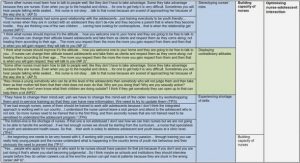Get Complete Project Material File(s) Now! »
Psychoanalytic Feminism
This theory emphasises the fact that oppression of women is embedded in their psyche (Tong 1989:5). This is said to be a product of the Freudian theory regarding the pre-Oedipal and Oedipus complex. In the pre-Oedipal stage all infants are naturally attached to their mothers. It is very likely that the first adult person that an infant encounters is the mother. This stage ends up in the oedipal complex, the process when a boy gives up his first love object, being his mother. This according to Tong is to escape castration at the hands of the father. During this process the boy becomes integrated with the dominant group in society. The girl takes longer to separate from her mother. Together with her, she ends up being the ruled, and both also fear their own power. This could be confirmed by the fact that the girl often remains to help her mother in the home longer than the boy does. She ends up inheriting her mother’s position as regards the chores that her mother does from day to day.
Feminism in the African Context
The diverse nature of women’s oppression often presupposes the need for a theoretical framework that will be able to reach deeply, and attack from various angles the patriarchy that is hidden within societal structures. Feminism is a theory that has become very unpopular in societies worldwide where patriarchy is strongly embedded in their way of life. In fact, this is a concept that was stigmatised owing to the fact that its core objective was to liberate women from the forces of patriarchy and oppression. It met strong opposition from some African members of society, especially those who have always been beneficiaries of the patriarchal system.
Womanism in the African Context
Much as there are African scholars who are committed to gender they tend to experience a serious difficulty with being labelled feminists. It has been observed that a majority of African feminists refuse to be called feminists because they do not want to be part of a movement that originates from Western countries. This however does not mean they are not convinced that the situation of women has to be improved drastically and that gender relations in African societies need radical transformation; they are themselves committed to making these changes happen. For this reason, African scholars dealing with women’s issues came up with different names for the movement that they were committed to. I find it appropriate to mention a few of the different names that were given to feminism as a movement in the African context.
The Performer
He or she comprises one element that forms the foundation of any performance. Without the performer the text cannot be brought into existence. Behague (1984:14) takes a performer to be an individual, who acts with the selfbelief and probably with some group’s approval or not, that he/she has acquired a respectable amount of knowledge and skill in a particular oral form and that he/she should be able to present those materials for listeners in a coherent, acceptable fashion. Furthermore, he/she takes the responsibility and performs for others. This does not confine this concept to a music rendition only.
Proverbs on Women as Weak Minded Beings
It is a common occurrence that women are associated with being mentally weak. They are often perceived as people who cannot use their minds and who cannot do anything of substance. For this reason in the African culture women are considered as children who need the guidance and protection of men. This perception is succinctly stated by Mathumba (1988:153) when he explains that amongst blacks, a woman does not enjoy the same social status as a man. He further explains that the two major qualities of a woman are bearing of children and industriousness. This philosophy about women can be confirmed by the proverbs that will be discussed in this section.
TABLE OF CONTENTS PAGE :
- Title page
- Declaration
- Acknowledgements
- Summary
- Dedication
- CHAPTER 1 INTRODUCTION
- 1.1 General Background
- 1.2 Context of Study
- 1.3 Motivation
- 1.3.1 Personal Motivation
- 1.3.2 Political Motivation
- 1.3.3 Academic Motivation
- 1.4 Literature Overview
- 1.5 The Current Study
- 1.6 Aims and Objectives
- 1.7 Methodology
- 1.8 Problem Statement
- 1.9 Definition of Key Concepts
- 1.9.1 Feminism
- 1.9.2 Womanism
- 1.9.3 Orality
- 1.9.4 Culture
- 1.9.5 Poetic Forms
- 1.9.6 Praise Poetry
- 1.9.7 Proverb
- 1.9.8 Women’s Leadership
- 1.10 Scope of Study
- 1.10.1 Chapter
- 1.10.2 Chapter
- 1.10.3 Chapter
- 1.10.4 Chapter
- 1.10.5 Chapter
- 1.10.6 Chapter
- 1.11 Concluding Remarks
- CHAPTER 2 THEORETICAL FRAMEWORK
- 2.1 Introduction
- 2.2 The Feminist Theory
- 2.2.1 Feminism and Diversity
- 2.2.2.1 The Liberal Feminist
- 2.2.2.2 Marxist Feminism
- 2.2.2.3 Radical Feminism
- 2.2.2.4 Psychoanalytic Feminism
- 2.2.2.5 Socialist Feminism
- 2.2.3 Feminism in the African Context
- 2.2.4 Womanism in the African Context
- 2.2.1 Feminism and Diversity
- 2.3 Performance and Orality
- 2.3.1 Performance and its Elements
- 2.3.2 The Performer
- 2.3.3 The Audience
- 2.4 Orality
- 2.5 Concluding Remarks
- CHAPTER 3 PROVERBS, WOMEN AND GENDER INEQUALITY
- 3.1 Introduction
- 3.2 Definition of a Proverb
- 3.3 The Dynamics of Proverbs
- 3.4 Nguni Proverbs, Patriarchy and Leadership
- 3.5 Analysis of Proverbs
- 3.5.1 Proverbs on Women as Mothers
- 3.5.2 Proverbs on Women and Marriage
- 3.5.3 Proverbs on Women as Weak Minded Beings
- 3.5.4 Proverbs on Women as Wicked Beings
- 3.5.5 Proverbs on Women and Authority
- 3.6 Concluding Remarks
- CHAPTER 4 ORAL POETRY AND THE AFRICAN TRADITIONAL WOMAN
- CHAPTER 5 ANALYSIS OF ROYAL WOMEN’S PRAISE POEMS
- CHAPTER 6 THE GENERAL CONCLUSION
GET THE COMPLETE PROJECT
A REFLECTIVE PERSPECTIVE OF WOMEN LEADERSHIP IN NGUNI ORAL POETIC FORMS




